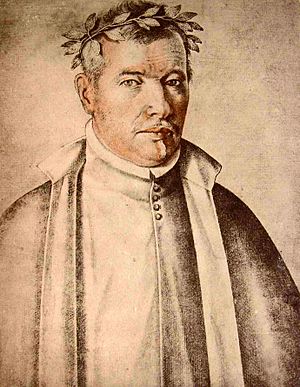Rodrigo Caro facts for kids
Rodrigo Caro was a very talented Spanish man who lived a long time ago, from 1573 to 1647. He was born in a town called Utrera and passed away in Seville. Rodrigo Caro was many things at once: a priest, a historian (someone who studies the past), an archeologist (someone who digs up old things), a lawyer, a poet, and a writer. He was known for his deep knowledge and his many books.
Contents
What Rodrigo Caro Wrote
Rodrigo Caro wrote many important books and poems during his life. His works often focused on the history and old stories of Spain, especially about the cities of Seville and Utrera. He loved to explore the past and share what he learned with others.
Books About History and Places
- Antiguedades y principado de la illustrissima Ciudad de Sevilla: This big book was about the ancient history and importance of the famous city of Seville. It also described the area around it.
- Relacion de las inscripciones y antiguedad de la villa de Utrera: In this book, Rodrigo Caro wrote about old writings and the history of his hometown, Utrera. It even included a Latin poem praising the town!
- Del principado de Cordova: This work explored the history of the region of Cordoba.
Books About Ancient Beliefs and Names
- Veterum Hispaniae deorum manes sive reliquiae: This book was about the ancient gods and beliefs of Spain. Rodrigo Caro was very interested in how people lived and what they believed in long ago.
- De los nombres y sitios de los vientos: This interesting book was all about the names and places where different winds come from.
- De la antiguedad del appellido Caro: Rodrigo Caro even wrote a book about the history of his own family name, Caro! He dedicated it to a relative named Don Fernando Caro.
Other Writings
- De los santos de Sevilla: This book was about the saints connected to the city of Seville.
- Trattati De ludis puerorum: This title means "Treatises on children's games." It shows that he was interested in many different topics, even how children played!
Rodrigo Caro's writings help us understand what life was like and what people thought about in Spain during the 1600s. He was a true scholar who loved learning and sharing knowledge.
See also
 In Spanish: Rodrigo Caro para niños
In Spanish: Rodrigo Caro para niños
 | Aaron Henry |
 | T. R. M. Howard |
 | Jesse Jackson |


